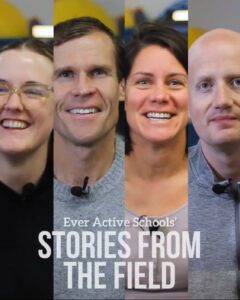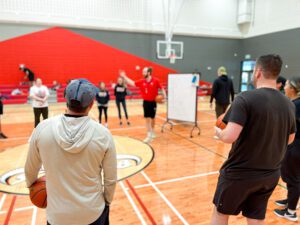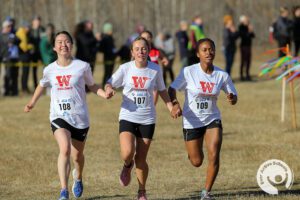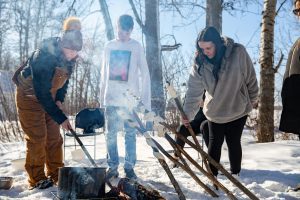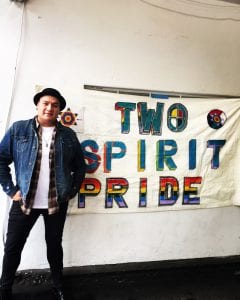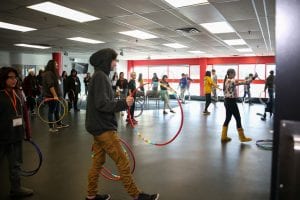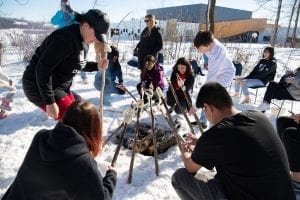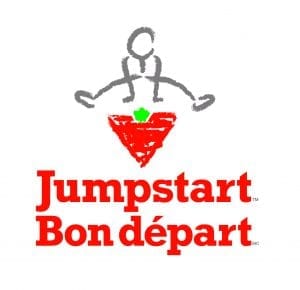See More Projects
Related Resources
Related Content
Stories From the Field
EVERYBODY PLAYS: LEAGUES OF PLAY
HOSTING A HISTORIC ATHLETIC EVENT
EMPOWERED, INSPIRED AND CELEBRATED: STILL I RISE
LAND-BASED LEARNING: CONSIDERING THE FUNDAMENTALS
ACKNOWLEDGING THE PAST THAT ENSURED OUR FUTURE
BEAUTY AND STRUGGLE: INDIGENOUS PEOPLES DAY 2021
CRAFTING MEANINGFUL LAND ACKNOWLEDGEMENTS
LEARNING TO EMBRACE THE COLD WEATHER
A TRADITIONAL FOODS CAMP IN ENOCH, ALBERTA
Indigenous Youth Mentorship Program (IYMP)
Vision
To create a world where Indigenous children and youth have safe, healthy places to be, belong, grow and give of themselves. We seek to build on the strengths of youth and their communities to support their journeys toward self-determination.
Mission
To develop and deliver relationship-based, communal mentor programs involving Indigenous youth and adult allies to nurture healthy, inclusive communities.
How It Works: IYMP is an after-school healthy living program delivered by Indigenous high school students for elementary school children. IYMP typically runs once per week for 90 minutes, delivering healthy snacks and moderate-to-vigorous physical activity for at least 20 weeks throughout the school year. Co-developed with Indigenous youth, educators, and researchers, IYMP promotes well-being, resiliency, and overall positive mental health, including Mino-Bimaadiziwin/Mino-Pimâtisiwin (“living in a good way”). It is grounded theoretically in teachings of Indigenous scholars Drs. Brokenleg (Circle of Courage) and Kirkness (The Four R’s). The core components of IYMP are: (1) healthy eating, (2) physical activity, and (3) relationship building and mentorship.
History:
IYMP originated in Winnipeg as a "Rec and Read" program. After a successful few years, a pilot program began in Northern Manitoba with the University of Manitoba in 2008. Research showed positive changes for the children and youth involved in the program, as well as the communities as a whole. Since 2011, the program has expanded to more than 50 communities, reaching over 1,400 elementary school children and more than 700 high school youth across Canada.
More About IYMP:
The Indigenous Youth Mentorship Program (IYMP) builds on the strengths, talents, and natural leadership of First Nations youth. Offered as either an after-school or lunchtime program, older students (usually high school) mentor younger students (usually elementary).
The older students are trained to design and implement a weekly program: preparing and serving a healthy snack, planning and leading active games, and facilitating teaching circles. Sometimes the older students themselves share teachings, and other times they invite local Elders, educators, or parents to share knowledge.
Youth require a sense of belonging, mastery, independence, and generosity to thrive. (Brendtro, Brokenleg, Van Bockern, 2005) Without positive role models and mentorship opportunities, youth may seek out these aspects through negative behaviours like crime and gang involvement, but there is strong evidence that through involvement in mentorship activities, crime related behaviours are reduced and health outcomes, high school completion rates, community involvement, and pro-social behaviours increase, particularly for rural First Nations youth. (Carmichael, 2008)
Research has shown that encouraging pride in one’s Indigenous identity can be an even more effective health intervention than encouraging healthy eating and active living alone. In an American pilot trial, individuals received either structured activity and nutrition interventions or unstructured activities emphasizing local Indigenous history and culture. Members of the cultural intervention group reported decreased risk factors for diabetes, including waist circumference, weight gain, and glucose level, as compared with the activity and nutrition interventions. (Narayan et al, 1998) Leadership programming has been shown to increase resilience in Canadian First Nations youth, (Ritchie et al, 2014) and learning traditional practices increases First Nations youth self-esteem, helping behaviours, pride, and pro-social behaviours. (Janelle, Laliberté, Ottawa, 2009)
Specifically in Alberta, encouraging the continuity of First Nations cultures has significant health impacts: “Cultural continuity, or "being who we are", is foundational to good health. Those [Alberta Cree and Blackfoot Nations] that appeared to have more cultural continuity (measured by traditional Indigenous language knowledge) had significantly lower diabetes prevalence after adjustment for socio-economic factors. (Oster et al, 2014)
Our initiative builds on a rigorously evaluated model of youth mentorship and resiliency-promoting activities from Manitoba, which develops First Nations youth leadership by allowing older youth on reserve to take on leadership roles. Leaders mentor younger youth in their own community through cultural activities, healthy eating and physical activity. A growing body of evidence, including almost 10 years of research from Manitoba, demonstrates the success of our approach in building youth resiliency and self esteem, enhancing protective factors against negative behaviours, improving health outcomes (e.g. healthy body weight) and school engagement. (Eskicioglu et al, 2014)(Halas et al, 2017)
Because adult role models come from the community and have established relationships with high risk youth, the program is able to specifically target those youth with highest need. Building upon existing local strategies for youth engagement, the program allows those identified to show leadership in a safe environment, building up their own positive skill set while encouraging the resiliency of a younger generation. By both interrupting teenage involvement in negative behaviours and preventing younger generations from being involved in the first place, these programs help break the cycle of marginalization, abuse and victimization across Alberta First Nations, increasing protective factors for youth and improving health outcomes for youth and families.
"Two youth have been instrumental in the program by buying in to the youth mentorship piece. Both students have done a remarkable job in the program as youth leaders and have taken on the task of building bridges between families who were previously divided in the community. This program is helping the community to heal by breaking down barriers between families that have prevented children from relating positively to one another."
- Principal of partner school
“The mentor program is good for this community because we teach the kids new things and to participate in activities and it also teaches the mentors to be good role models for the kids.”
- High School Mentor from Zaagiing First Nation”
“I’ve had numerous exciting experiences that have changed my life for the better and helped me change the lives of others. The largest successes I have seen from the program in my community are belonging, mastery, independence, and generosity. The program achieves belonging by providing all our youth a place of comfort, security, safety, and a place simply to have; mastery by encouraging youth never give up on themselves or each other and to always strive to be great at whatever they are doing; independence by fostering youth to make positive life choices and building resiliencies towards negative affiliations; and generosity by demonstrating the willingness to help others as much as possible as well as bonding in a family-like environment.”
- Host Community Partner
